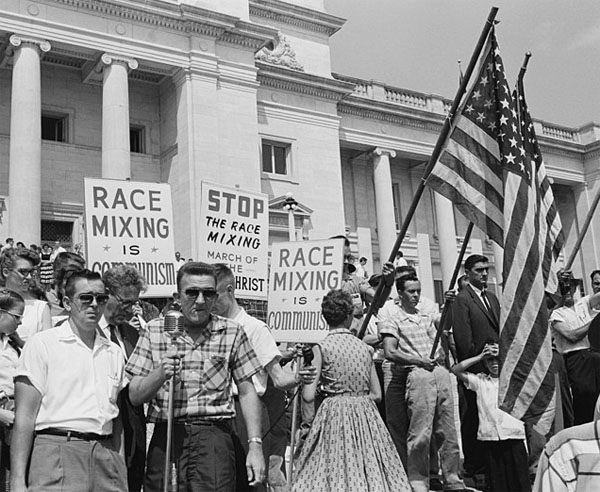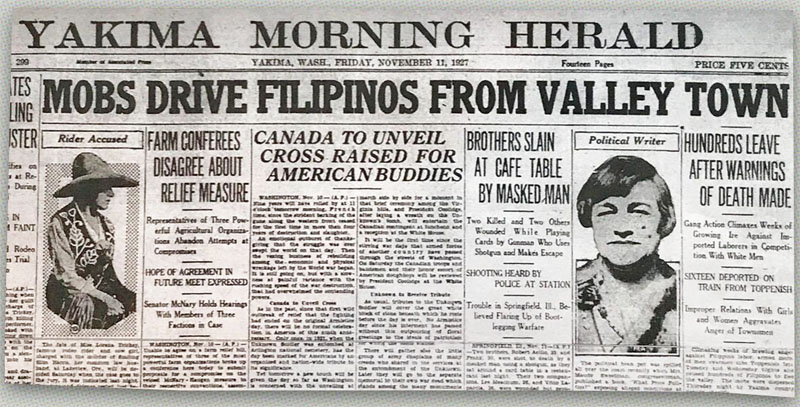OPINION
Let’s vote for opportunity, not division
Ignore attempts to inflame racial divisions; approve I-1000 for shared prosperity
By APRIL SIMS
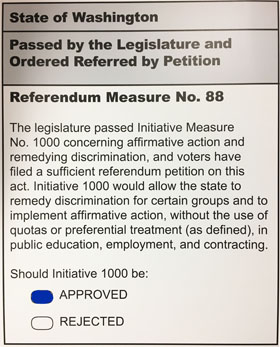 (Oct. 31, 2019) — By November 5, Washingtonians have the chance to restore opportunity and access in our state with Initiative 1000 via Referendum 88. But there is a fierce opposition to this initiative, one that’s using age-old tactics to divide and misinform.
(Oct. 31, 2019) — By November 5, Washingtonians have the chance to restore opportunity and access in our state with Initiative 1000 via Referendum 88. But there is a fierce opposition to this initiative, one that’s using age-old tactics to divide and misinform.
I-1000’s opposition is deploying people and stereotypes from marginalized communities in an attempt to deny opportunity and access to other historically marginalized groups. This is a time-honored tactic that we have seen deployed throughout this nation’s history to support white supremacy in this country.
This tactic functions in distinct ways. Centrally, it creates an ultimate straw man and scapegoat for the prejudices of White people. Often, this takes the form of anti-blackness.
White supremacy and anti-blackness go hand-in-hand, both as old as this nation and fundamentally connected to its existence. We’ve discussed the particular nature of racism and oppression that Black folks have faced in the U.S. previously this year (here, here and here), but we haven’t focused as directly on white supremacy.
From the creation of race in the early 17th century as a method to divide working people and break worker power, White people and Black people have been set against one another as bookends on an artificial racial hierarchy. Maintaining a hierarchy that artificially divides people with so much in common requires a persuasive belief system to entrap those that will benefit and harm those who will not. White supremacy — the false belief that white people are fundamentally superior to all other people, and that this superiority can and should be enforced by violence — fills this role.
Anti-blackness is an aspect of white supremacy, a belief in the inferiority of Black people. Anti-blackness is overt violence against Black people, but it also takes the form of stereotypes, microaggressions, and misrepresentations of Black Americans and our history. At its core, anti-blackness is about relegating Black people to the bottom of this country’s racial hierarchy.
U.S. history is rife with examples of ethnic groups using anti-blackness to navigate this hierarchy. In the late 19th and early 20th century, the waves of Irish, Hungarian, Italian, and Polish immigrants coming to the U.S., many of whom were illiterate or could not speak English, found themselves targets of discrimination from American-born Whites, who saw these European immigrants as a threat to their political power. These immigrants joined violent mobs attacking Black people, enforced anti-Black segregation laws, and protested Black folks moving into the neighborhoods they lived in.
It is a misguided and ultimately futile attempt to escape the real impacts of being the target of racism. Because the clear lesson of American history is that racism is not reserved for Black people in the U.S.; rather, it’s a toxic force deployed against all people. The only race-based immigration law ever upheld in this country was the Chinese Exclusion Act of 1924. In Washington, two of the most well-known race riots in our history saw white mobs attacking Asian Americans in Wenatchee and Yakima.
To attack the work ethic and character of Black folks, to invoke anti-Black rhetoric, or distort the history of Black Americans follows this pattern of marginalized groups doing the wet work of white supremacy. This is the behavior that I-1000’s primary opposition is engaged in. They claim there is no need for affirmative action in Washington while simultaneously reinforcing the racism that has denied opportunity to so many.
So why would anyone harmed by white supremacy do anything to support it, consciously or not?
 It’s a reactionary response, born out of a sense of scarcity. But there is an abundance of opportunity in Washington. Opponents of I-1000 act as if opportunity is a zero-sum game; if they have it, then we don’t. But we’re living in a state with a steadily growing economy, with numerous public universities to educate Washingtonians. There is more than enough to go around; I-1000 is about making sure all of us can share in this wealth of opportunity.
It’s a reactionary response, born out of a sense of scarcity. But there is an abundance of opportunity in Washington. Opponents of I-1000 act as if opportunity is a zero-sum game; if they have it, then we don’t. But we’re living in a state with a steadily growing economy, with numerous public universities to educate Washingtonians. There is more than enough to go around; I-1000 is about making sure all of us can share in this wealth of opportunity.
Because the reality is that the impacts of centuries of slavery, decades of state-sponsored racism, and generations of Black Americans over-incarcerated have not been erased and reversed in the past 50 years.
I-1000 allows modest outreach and recruitment efforts to be used by public universities, and for public employment and government contracting, without the use of quotas. It would expand current opportunities for veterans, and offer an avenue for access to women, older folks, people of color, and many small business owners.
I-1000 is only part of the work we must do to combat racism. Win or lose at the ballot, the WSLC is committed to continuing to fight for all working people against the forces that seek to enslave the human soul. We’re committed to dedicating resources to fighting racism both within our movement and without.
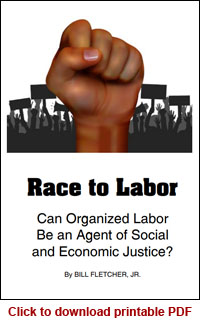 To that end, we’ve passed a series of successive resolutions articulating the labor movement’s role in combating racism and developed and ran trainings on Race & Labor, offering the history and tools needed to address discrimination in our movement. We continue to work in partnership with community organizations advocating for the rights of people of color, and we’re growing our immigration advocacy work in the Yakima Valley region. We’re committed to building a Washington that works for all of us.
To that end, we’ve passed a series of successive resolutions articulating the labor movement’s role in combating racism and developed and ran trainings on Race & Labor, offering the history and tools needed to address discrimination in our movement. We continue to work in partnership with community organizations advocating for the rights of people of color, and we’re growing our immigration advocacy work in the Yakima Valley region. We’re committed to building a Washington that works for all of us.
It’s that commitment that informs our adamant support for Initiative 1000. We’ve seen opponents of I-1000 use dirty, tired tricks to maintain a status quo that holds people of color back, and they’re willing to work with white supremacist groups and distort the history of discrimination in this country to get what they want.
We’ve seen this divisive, racist rhetoric in our national politics, and have seen just how senseless and toxic it truly is. With this election, we have the opportunity to reject discrimination and lies; I urge you to vote to Approve I-1000 (under Referendum 88) on your ballot by November 5.
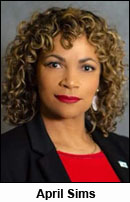 April Sims is Secretary Treasurer of the Washington State Labor Council, AFL-CIO, representing the interests of more than 600 union organizations with approximately 550,000 rank-and-file members. She is also Co-Chair of the Washington Fairness Campaign to Approve I-1000/R88.
April Sims is Secretary Treasurer of the Washington State Labor Council, AFL-CIO, representing the interests of more than 600 union organizations with approximately 550,000 rank-and-file members. She is also Co-Chair of the Washington Fairness Campaign to Approve I-1000/R88.

